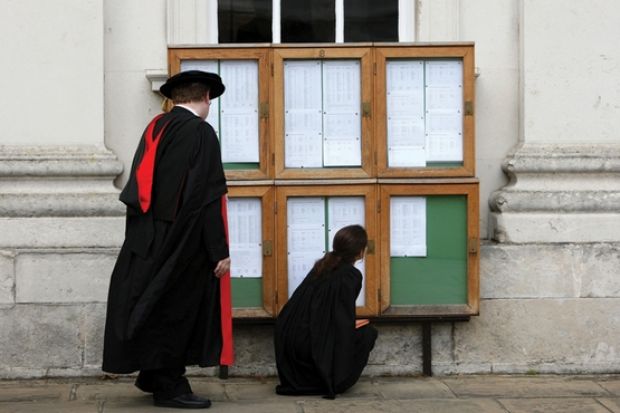Source: Alamy
Financial results: 2:1= more money
Graduates who scrape upper second-class degrees earn over £2,000 a year more in their first jobs than those who narrowly miss out on what is now a must-have for many employers.
Researchers at the London School of Economics have found that graduates who just manage to achieve a 2:1 earn 7 per cent more on average than those who fall short by a single mark.
While the long-term impact on graduate income is not yet known, if the initial earning gap persists it could mean graduates with low 2:1s earn an estimated £81,000 more over a 40-year working lifetime than those with high 2:2s.
The study comes at a time of heightened concern about the fairness of the UK’s degree-classification system.
Critics argue that a US-style grade-point average (GPA) scheme is required to smooth the “cliff edges” between UK classifications that can harm the long-term employment prospects of those falling short of 2:1s by a few marks.
The study into the “2:1 effect” was carried out by Andy Feng and Georg Graetz, two PhD students at the LSE’s Centre for Economic Performance, who analysed the marks and future earnings of graduates leaving the school between 2005 and 2010.
To see if the final classification made a difference to students of similar academic ability, they looked at the salaries of graduates whose marks were just above the 2:1 threshold compared with those who were just below.
Since the critical threshold for a 2:1 is achieving 60 per cent in at least four papers out of nine, they focused on the mark of the fourth-highest exam.
Those scoring 60 per cent in their fourth paper should get a 2:1, while those with 59 per cent should only get a 2:2.
Six months after graduation, the pay-off for achieving a 2:1 was already substantial, said Mr Feng, even when students entering the finance industry, which has atypical salaries, were excluded.
“These higher salaries were caused by the 2:1 effect and nothing else,” he said.
“These were students who were broadly [at] the same academic level and it was just a matter of what side of the threshold they fell.”
There is also a small earnings premium for graduates who narrowly score first-class degrees, the study says.
They earn about 3 per cent (£1,000 a year) more than students who have to settle for high 2:1s.
However, men are more successful in exploiting their first-class degrees to gain higher-paid jobs than women.
Male graduates pick up about 6 per cent in higher wages - £1,800 a year - from firsts, but women receive nothing. Over a 40-year career, such an earnings premium could be worth about £71,000, the researchers estimate.
The Higher Education Academy is currently consulting with universities to see if there is an appetite for a GPA classification system, while most institutions are introducing the Higher Education Achievement Report to reflect wider student accomplishment.
Register to continue
Why register?
- Registration is free and only takes a moment
- Once registered, you can read 3 articles a month
- Sign up for our newsletter
Subscribe
Or subscribe for unlimited access to:
- Unlimited access to news, views, insights & reviews
- Digital editions
- Digital access to THE’s university and college rankings analysis
Already registered or a current subscriber? Login




